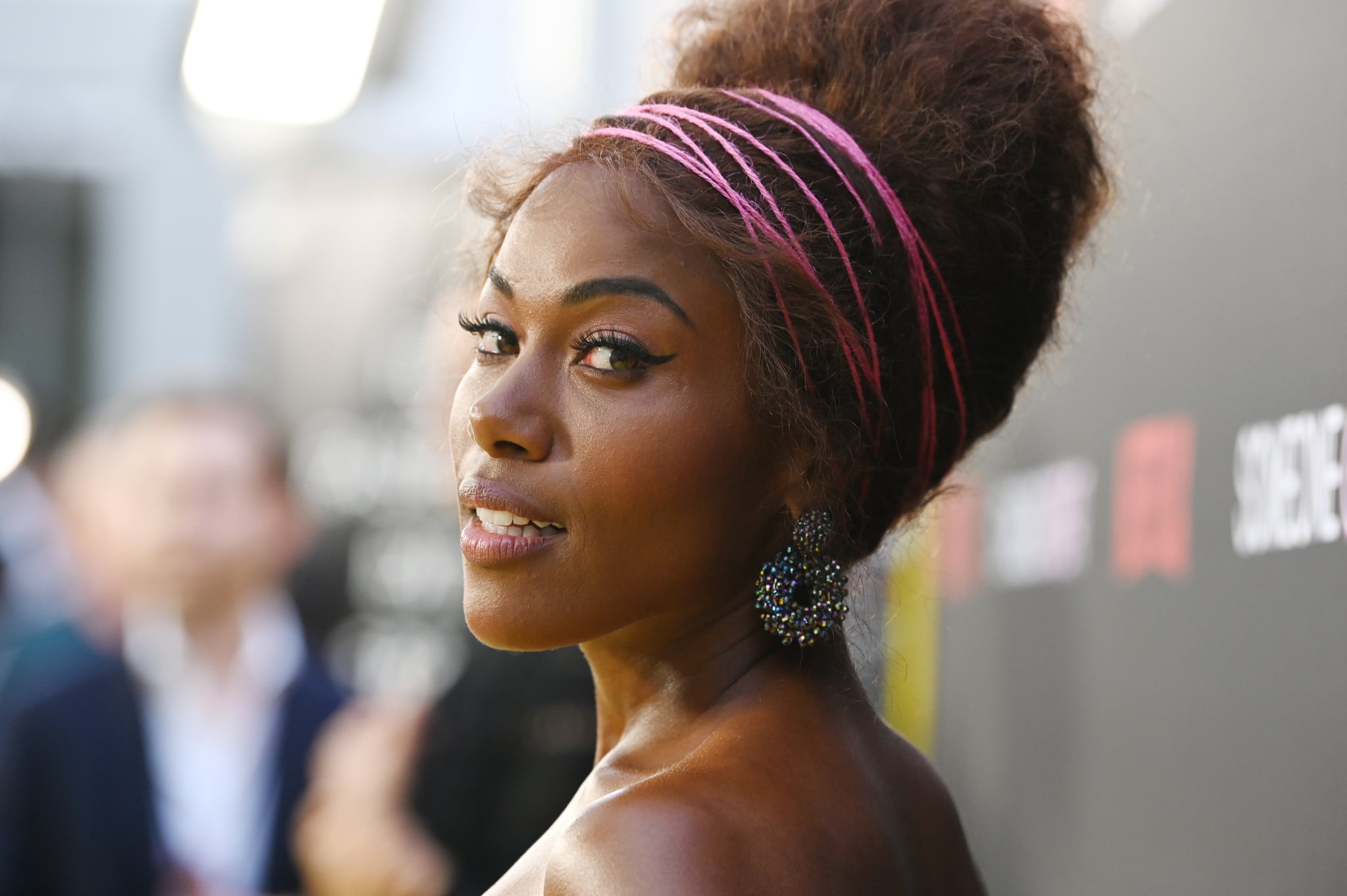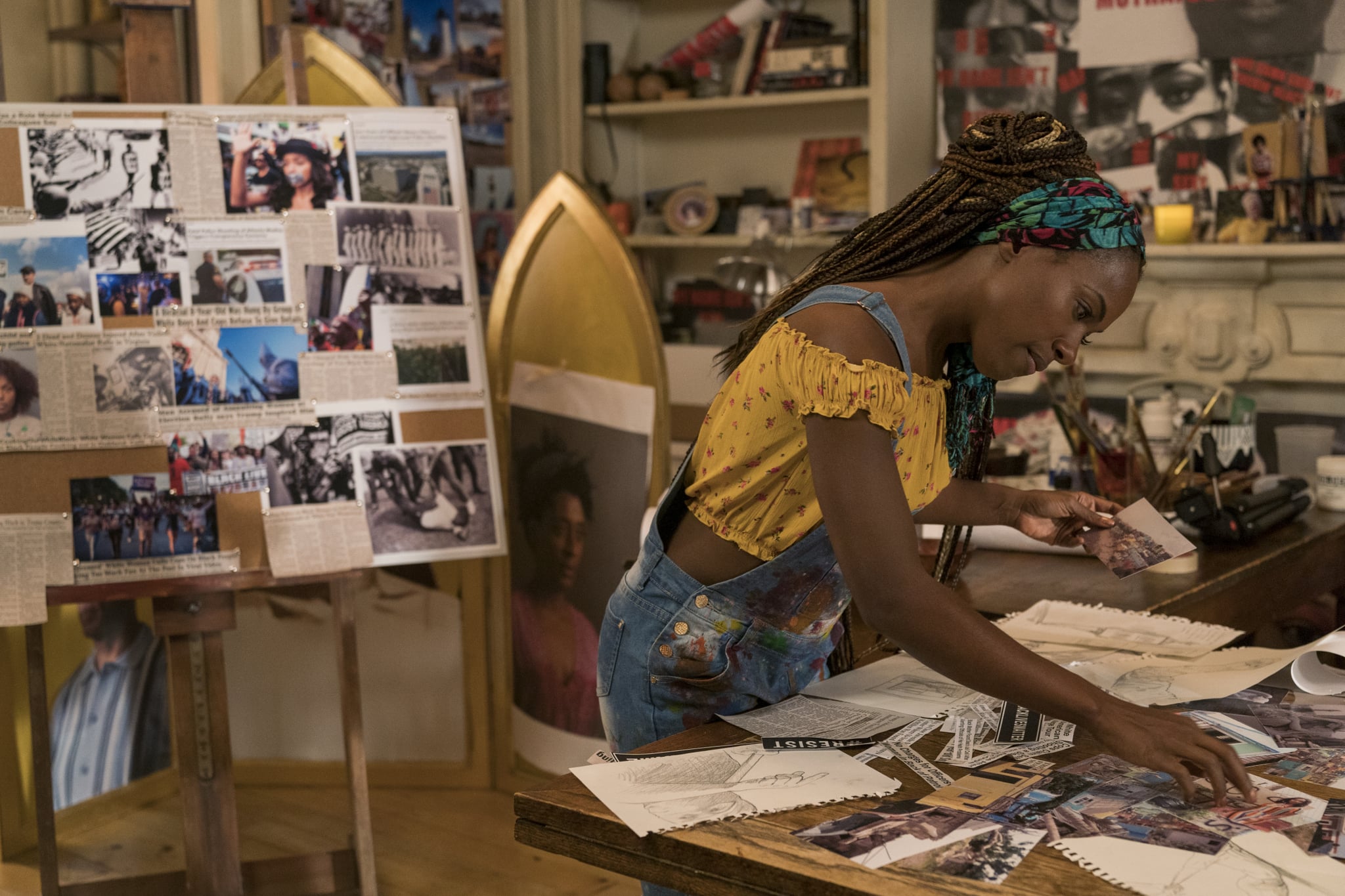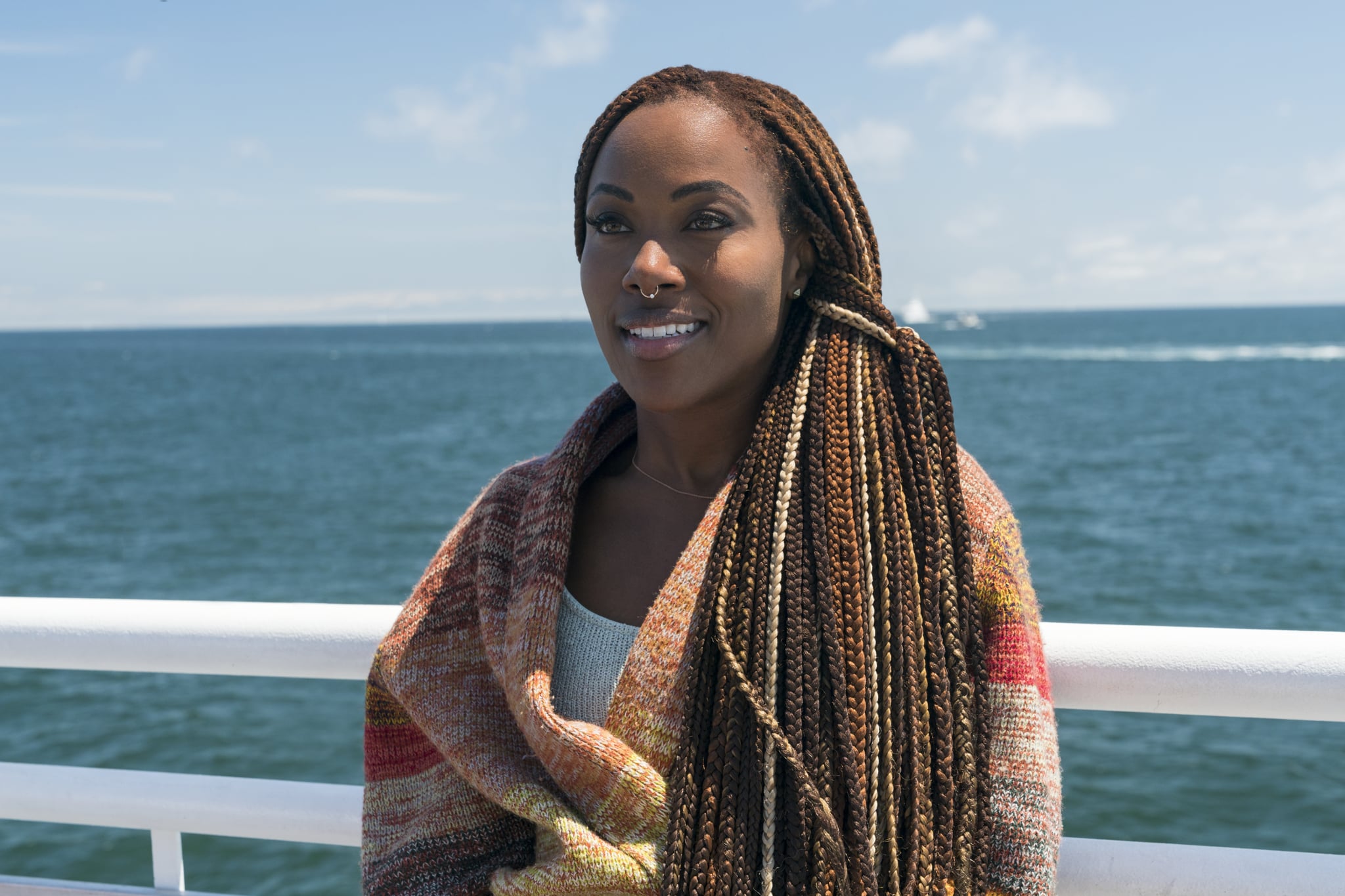
There is an infectious joy to DeWanda Wise's voice that can't be resisted, especially when chatting over the phone while thousands of miles apart. For two years the 35-year-old actress made Netflix subscribers fall in love with her, first as Nola Darling in the recently cancelled [1], Spike Lee-directed series based on his 1986 film She's Gotta Have It [2], and then as Erin Kennedy in Someone Great [3], the romantic comedy that had everyone singing Lizzo's "Truth Hurts" [4] with relish. Though the two have a few differences between them, each one has a thread of Wise that is impossible to miss: a bright vivaciousness that you can't help but be drawn by.
While promoting her new venture Project Purple Light with Barefoot Wine [5], which celebrates the self-expression of black women as art, Wise spoke with POPSUGAR about how her work in She's Gotta Have It gave her a new awareness about the joys and impact of black art [6]. Her campaign focuses on women of colour living their best lives — a notion that Wise and her characters definitely live by — with Barefoot donating $10,000 to the Black Art Futures Fund, which helps preserve black arts and culture across the U.S.
"The initiative really hit me in the solar plexus, because I just thought of it as very necessary," Wise explained. "I'm trying to seek out more programs that shine a light on and give a leg up to people who could actually use it."
But as Wise revealed to us, her relationship with art reached a whole new level after she took on the role of She's Gotta Have It's artist extraordinaire. Keep reading for her thoughts on the show's impact, cancellation, and why you can never accuse her of taking on more than she can handle.
POPSUGAR: So, tell Me about Project Purple Light and why it's an important initiative.
DeWanda Wise: Project Purple Light was kind of a no-brainer for me, having played a visual artist for two seasons of television. And I think there were two components of it that felt like a match: one, this notion of celebrating the natural and organic artistry of black women in how we express ourselves, influence and inspire each other, and operate best in community.
Then, the other component is this donation to the Black Arts Fund that just really caught my eye. There's an episode in season two of SGHI where we spend a lot of time with a bunch of visual artists. There's Carrie Mae Weems, Amy Sherald, LaToya Ruby Frasier, and all these other really exceptional visual artists. What they didn't show in the episode is that conversation was like 40 minutes long. In most industries, marginalized communities have a harder go and everything just more difficult. So part of that conversation was to kind of dissect the ins and outs of what it means to navigate the visual arts world as a black woman. And it just really struck me how I was able to draw a lot of parallels.
So when Project Purple Light came up, that component of the initiative really hit me in the solar plexus, because I just thought of it as very necessary. I'm trying to seek out more programs that shine a light on and give a leg up to people who could actually use it.
PS: How has playing an artist on She's Gotta Have It helped shape your outlook on art and, specifically, black art?
"I found myself looking around and just recognising these kind of vacancies and spaces that we weren't in yet."
DW: I think I have more of an awareness and appreciation. I grew up in Maryland and DC where you have access to places like the Smithsonian and it's basically like your birthright — you just get to go for free. It's only now, in the last several years, that we have the Black History Museum. So for me growing up, visual art was something that was inherently white and largely European. That's what it meant to me. The closest I got to having art in my house that was like black art was from a flea market. And it was like Black Jesus.
PS: I was just about to ask if it was Black Jesus!
DW: [Laughs] Yeah, he was black and he had dreads. So it was just one of those things that I don't think really crossed my mind until I started playing Nola. And then I found myself looking around — I love museums — and just recognising these kind of vacancies and spaces that we weren't in yet.
PS: So has there been a change in the type of art that you prefer to express yourself through now?
DW: Not with any degree of expertise, but absolutely when it comes to my appreciation for photography. I wouldn't dare call myself a photographer! But for season two, I trailed my friend, Ashley Ray, and she was essentially my photography tutor so that I wasn't a complete disaster. I think it's also why I've always loved Instagram, because so much of it is about the lens through which you see the world, your literal frame of reference for things. I think if I were to start collecting any art, it would probably be photography.
 Image Source: Netflix
Image Source: Netflix
PS: Have you had any meaningful experiences with black fans, artists, or creatives who watch She's Gotta Have It?
DW: I'm actually really grateful for social media in that respect. I think the folks who most identify with Nola, and the people who express being the most changed, are artists. And I think that's across the board with musicians, visual artists, and with actors. I get the most beautiful testimonials from other artists because there's so much that goes into what we do that's really almost impossible to understand. There would be folks who watch the show and think of Nola as impulsive and immature, and like she didn't have her sh*t together. But so much of what she is battling and working towards is finding a level of freedom to express herself so that her art isn't compromised. And you only understand that kind of selfishness if you've actively been working towards being an artist.
I worked nine months out of the year last year and my husband [Alano Miller], at the end of the nine months, was like, "Do you want to be married or are you going to take a break?" So these necessary life compromises are real, and you don't really understand it unless you've lived a life of sacrifice. So a lot of artists and a lot of activists had really beautiful things to say. There was a woman who came to me and told me that she had been recovering from cancer in a hospital and her husband bought her a Netflix account so she wouldn't be bored. She ended up watching the show that way and she said Nola's fight for joy, her unabashed and unmitigated expression, kept her going. And that's something that you can't really plan. You never know how your work is going to impact others, but thanks to social media, now you kind of do. It's really wild in that respect.
PS: That's such a beautiful story! I can't even imagine meeting someone and hearing that you've had that kind of impact on them. And you always seem to be working on something; as you were just saying, you worked nine months out of a year once. How do you find balance with everything you want to do and everything you have to do? What is your form of self-care?
DW: I don't do more than I should. My husband and I are also producing partners, and we have a slate. I know it's customary for people to just try to put a lot of pots on the stove at same time and see which one boils first, but I don't have the capacity for that yet, so I'm very one thing at a time. I've always been one project at a time. It gets all of my blood, sweat, tears, literally. It gets all of my attention. And then when I can come up for air, I go like, "Okay. What could I do next?"
"I try not to give into societal norms that say you're supposed to work yourself to death. I don't believe in that."
When I was completing season two of She's Gotta Have It, I auditioned for a play, a drama set in 1963. I auditioned for it on a Saturday towards the tail end of our process, which is kind of how I operate. I go, "Okay. What do I want to do next that I want to give all of my attention to?" And I take it day by day so I don't overextend, I don't overwork myself. I can't do PR when I'm working, I don't know how people do that. They are actual superheroes. But for me, it's a very simple formula. And, in that respect, I really just try not to give into pervasive, American societal norms that say you're supposed to work yourself to death or work yourself to depletion. I don't believe in that.
PS: So is there anything in particular you look out for when considering roles? Especially since roles for black women can be pigeonholed in the media.
DW: Well, there are things that I read that I just register as it's not for me. I think if I think too deeply about it, or if I take it personally, then I don't know how I would have kept going. But my agent's a black woman, so I don't necessarily have that experience where I'm reading something and I feel offended by it. And I think that's a testament to where we're at, and having more opportunities that are coming from women, that are coming from marginalized communities, and people of colour. Plus, it's very simple for me: if I read something and it moves me, then I'm in.
Right now, I'm working on Fatherhood with [film director] Paul Weitz — who I'm a huge fan of. I read Fatherhood and it's based on this really beautiful book called Kisses for Maddy, which is a memoir of Matt Logelin's experience after his wife passed in childbirth. I just thought it was miraculous, what we can endure, what human beings can move through and come out on the other side having survived. So, if I read something and it doesn't hit somewhere, if it doesn't make me crack up laughing or send me to a corner weeping or make me think about the meaning of life, I won't do it. Then from there, I go, "Do I want to work with these humans?" And that's it. That's where it's at at present. I'll let you know when I get a mortgage. [Laughs]
PS: Okay, I feel that! And speaking of, you've worked with a lot of amazing people on various projects. Who is someone on your bucket list that you would love to work with in the future?
DW: Man. Definitely Ryan Coogler. No-brainer! And then also, there are a lot of my peers that I've already worked with that I can't wait to collaborate with again. I cannot wait to work with Terence Nance again, speaking of experimental. He's just brilliant, he's another Donald Glover. Speaking of Donald Glover, we were classmates [at New York University's Tisch School of the Arts] and I would love to work with him! I'm thinking of my girl, Nikyatu Jusu. I'm thinking of Mtume Gant. They're all these really exceptional young filmmakers that I cannot wait to be unleashed on the world.
 Image Source: Netflix
Image Source: Netflix
PS: And of course we have to talk about the second season of She's Gotta Have It. Netflix recently announced the series' cancellation — what was your response?
DW: I feel like we completed two seasons of television with Spike as the filmmaker. And the way that the story ended for season two felt like a resolution. There is no cliffhanger, there's no ambiguity, no one has a new loving bed banister now. I feel really satisfied and really proud of the work that our cast and crew did. We sought to bring Nola Darling — who is like a cinematic icon, ground zero for black women — to 2017. We premiered the show during the height of Time's Up and #MeToo. And she became her own sort of fierce, ferocious, feminist icon when we premiered, and what else can you ask for? Yeah, I'm super happy and proud and complete, and I'm really, really honoured to have it as a part of story, as a part of my journey.